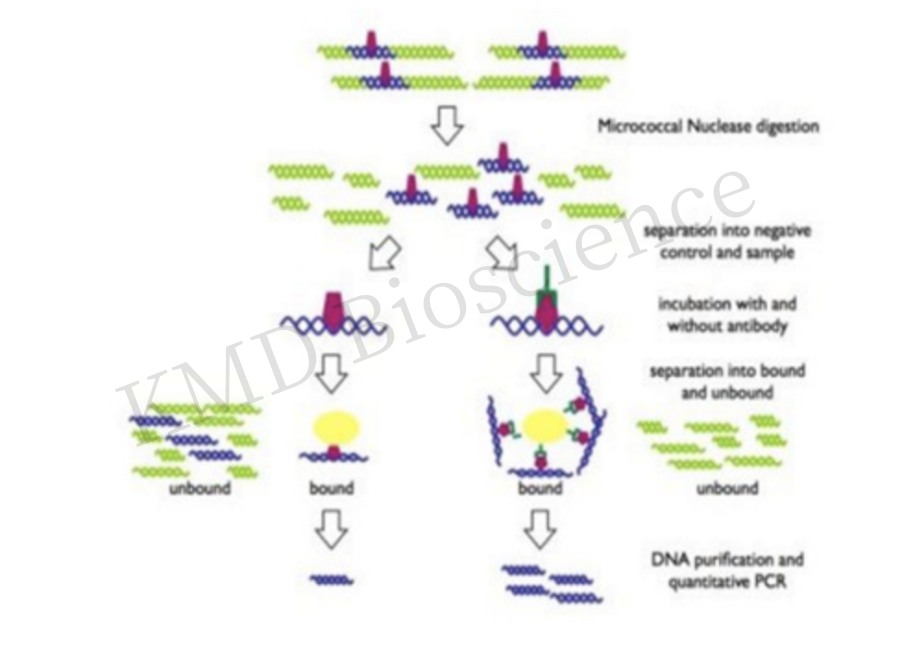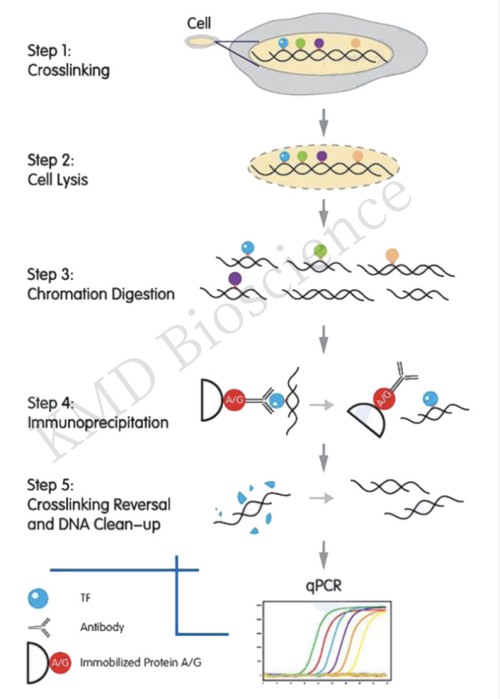Service Line:+86-022-82164980
Address:FL-4, Building A5, International Enterprise Community, Tianjin, China
Email:[email protected]
KMD Bioscience has been dedicated to the study of protein-protein interactions for over 10 years. Eukaryotic genomic DNA exists in the form of chromatin, and the study of protein-DNA interactions in the chromatin environment is a fundamental way to elucidate the mechanisms of eukaryotic gene expression. Scientists in KMD Bioscience, who have accumulated a wealth of experience in immunoassay technology, can quickly customize protein-nucleic acid interaction study assays for different clients. With years of technical expertise, KMD Bioscience is not only able to complete chip experiment content quickly but also to ensure that each step of the experiment is carefully controlled to ensure that the test results are accurate, objective, and credible. KMD Bioscience, which has complete protein detection equipment, has established mature and perfect antibody platforms, protein platforms, and other technology platforms. At the same time, KMD Bioscience has rich experience in recombinant tagged protein expression and can express recombinant proteins with GST, Myc-tag, Flag-tag, HA-tag, etc., in both prokaryotic and eukaryotic expression systems for our customers. Utilizing antibodies specific to these tagged proteins, KMD Bioscience can offer its clients chromatin immunoprecipitation technology.
Chromatin Immunoprecipitation (ChIP) is a powerful tool for studying protein-DNA interactions in vivo, and it can be used not only to detect the dynamic interactions between trans factors and DNA in vivo but also to study various covalent modifications of histones as well as the relationship between transcription factors and gene expression. ChIP techniques generally include cell fixation, chromatin breakage, chromatin immunoprecipitation, reversal of cross-linking reactions, DNA purification, and identification. Unlike co-immunoprecipitation techniques that can probe protein interactions, ChIP can truly and completely reflect the regulatory information of target proteins bound to the promoter region of DNA, and it is a standard experimental technique to study DNA-protein interactions based on the whole genome level and is also a commonly used method for detecting protein-DNA interactions in the natural chromatin environment in vivo. ChIP experiments have the advantage of being able to capture specific protein-DNA interactions in a system and quantify the interactions using quantitative polymerase chain reaction (qPCR.) ChIP is increasingly becoming an important tool for studying transcriptional regulation in eukaryotic cells.
ChIP experimental operation steps are more complicated, to achieve the final experimental purpose, not only to understand the experimental process but also to feel the concentration of reagents, and feel the details of the experimental process. To avoid the waste of samples and save customers valuable time, Kamed Bio can provide customers with high-quality ChIP outsourcing service. KMD Bioscience's researchers strictly control the quality of each key step in the experimental process to ensure that customers can get the ideal results.

Fig 1: Principle of chromatin immunoprecipitation (ChIP) experiment
|
ChIP |
|
|
Experimental principle |
Protein-DNA complexes are immobilized with formaldehyde in the state of living cells and ultrasonically cut randomly into small fragments of chromatin within a certain range of lengths, then antibodies to the target proteins are added, the target protein-DNA complexes are precipitated by the antibodies, the enriched target protein-DNA complexes are obtained utilizing elution, and the DNA fragments bound by the target proteins are specifically enriched for protein-DNA interactions through the purification and detection of the target fragments (PCR analysis). |
|
Applications |
* Antibodies to histone modifying enzymes as "biomarkers" * Transcriptional regulation analysis * Mitosis studies * Drug development studies * DNA damage and apoptosis analysis |
|
Advantages |
* Capable of capturing transcription factor-target gene interactions in vivo * Ability to rapidly provide regulatory mechanisms for one or more genes simultaneously |

Fig 2: Process of chromatin immunoprecipitation (ChIP) experiment
--Experienced experimental operation level and experimental process, unique ChIP experiment optimization process, and high IP efficiency, can ensure a high success rate of the experiment.
--Rich experimental experience, with the ChIP assay service department, the experimental staff has many years of successful experience in ChIP experiments, for different plant and animal tissues and has different pre-treatment methods, to ensure that the experimental results are more accurate and reliable.
--With perfect supporting testing equipment, imported instruments and reagents, high-standard methanol cross-linking, and Bioruptor ultrasonic interruption, the results can be further analyzed.
--Experienced team of experts to do technical support to solve all kinds of ChIP technical problems.
--Complete information analysis, provide detailed and complete experimental reports and provide gel electrophoresis results, chip sequencing results, and chip-seq data analysis.
--With a mature protein platform and antibody production platform, we can develop customized experimental solutions for customers, providing a true one-stop service experience.

If you have any questions regarding our services or products, please feel free to contact us by E-mail: [email protected] or Tel: +86-400-621-6806